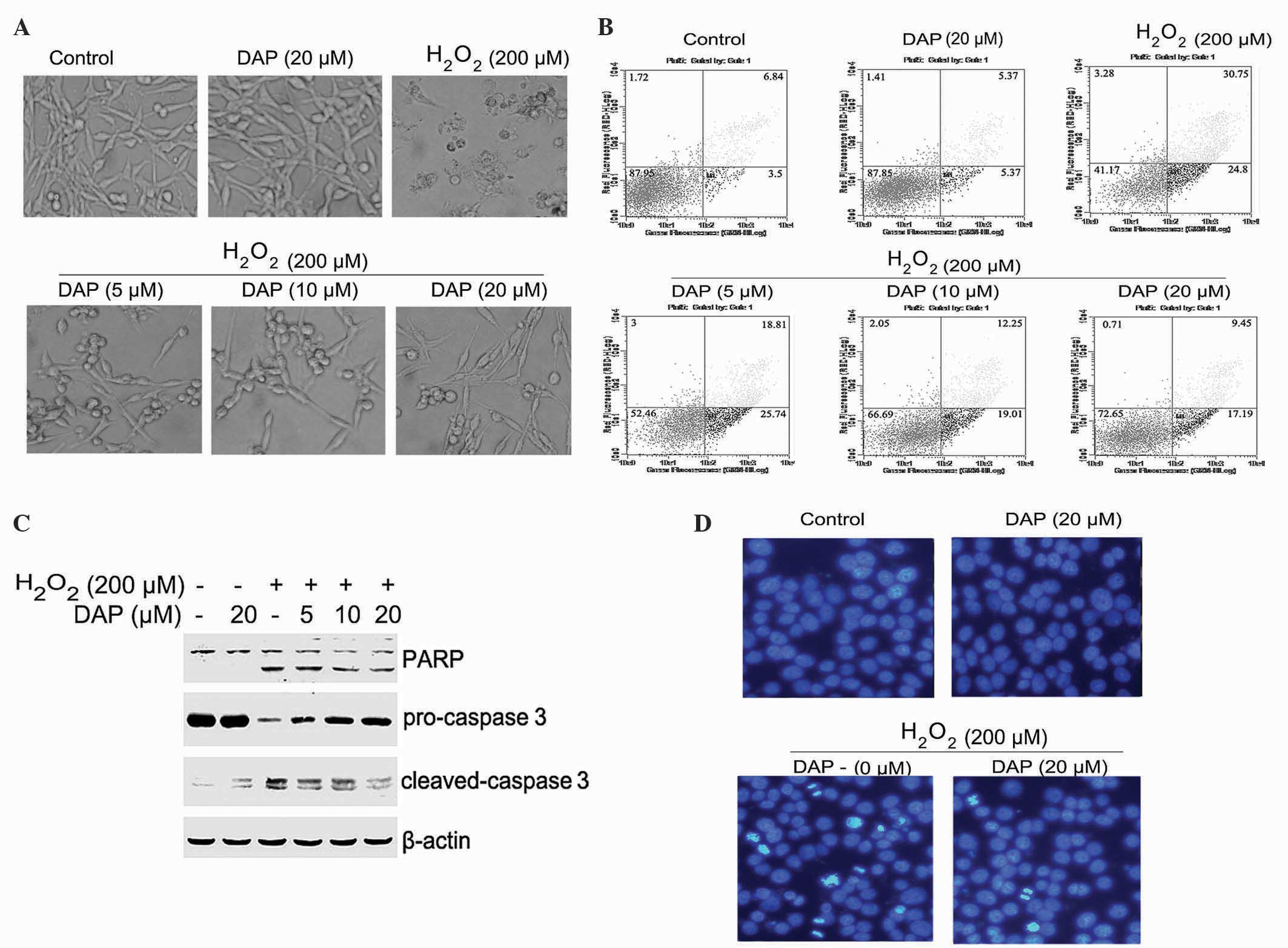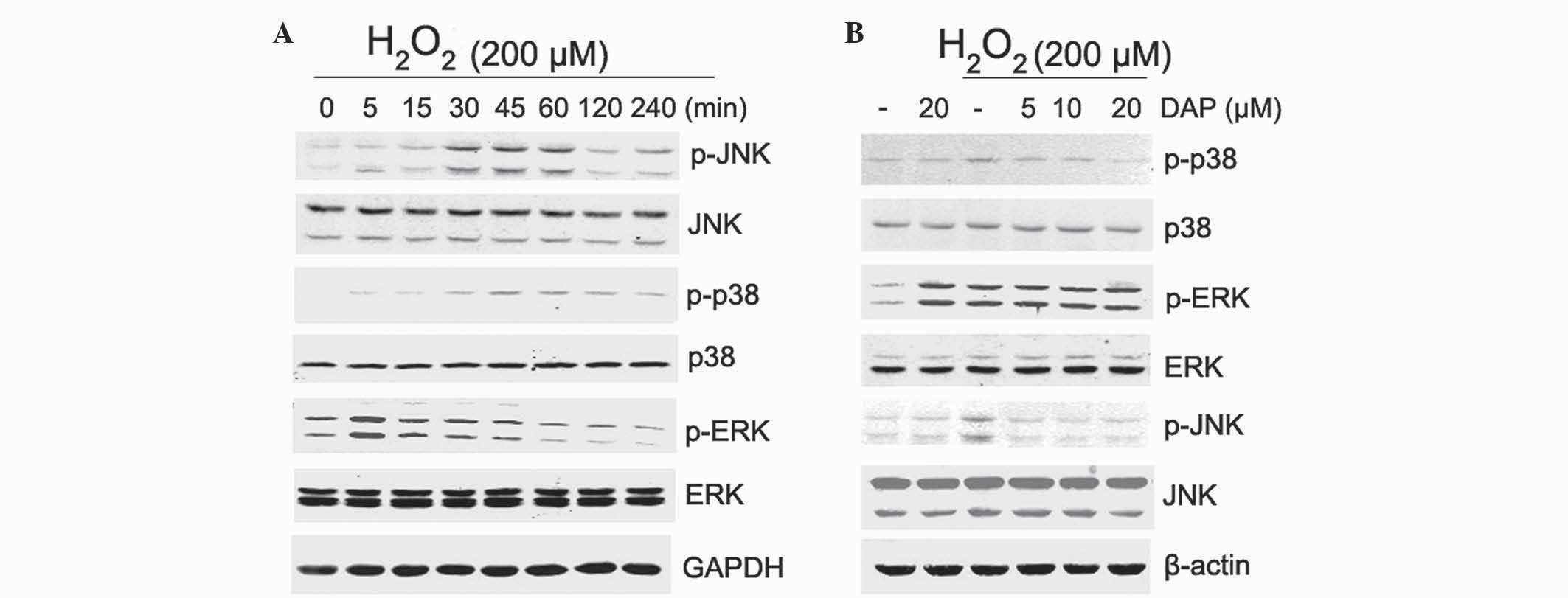|
1
|
Gong QH, Shi XR, Hong ZY, Pan LL, Liu XH
and Zhu YZ: A new hope for neurodegeneration: Possible role of
hydrogen sulfide. J Alzheimers Dis. 24(Suppl 2): S173–S182.
2011.
|
|
2
|
Pan LL, Liu XH, Jia YL, Wu D, Xiong QH,
Gong QH, Wang Y and Zhu YZ: A novel compound derived from danshensu
inhibits apoptosis via upregulation of heme oxygenase-1 expression
in SH-SY5Y cells. Biochim Biophys Acta. 1830:2861–2871. 2013.
View Article : Google Scholar : PubMed/NCBI
|
|
3
|
Chong ZZ, Li F and Maiese K: Oxidative
stress in the brain: Novel cellular targets that govern survival
during neurodegenerative disease. Prog Neurobiol. 75:207–246. 2005.
View Article : Google Scholar : PubMed/NCBI
|
|
4
|
Asaithambi A, Kanthasamy A, Saminathan H,
Anantharam V and Kanthasamy AG: Protein kinase D1 (PKD1) activation
mediates a compensatory protective response during early stages of
oxidative stress-induced neuronal degeneration. Mol Neurodegener.
6:432011. View Article : Google Scholar : PubMed/NCBI
|
|
5
|
Karuppagounder SS, Pinto JT, Xu H, Chen
H-L, Beal MF and Gibson GE: Dietary supplementation with
resveratrol reduces plaque pathology in a transgenic model of
Alzheimer's disease. Neurochem Int. 54:111–118. 2009. View Article : Google Scholar : PubMed/NCBI
|
|
6
|
Yin W, Zhang X, Shi X and Li Y: Curcumin
protects SH-SY5Y cells from oxidative stress by up-regulating HO-1
via Phosphatidylinositol 3 Kinase/Akt/Nrf-2 and down-regulating
HO-2. Mol Neurodegener. 7(Suppl 1): S142012. View Article : Google Scholar
|
|
7
|
Zhang L, Ding W, Sun H, Zhou Q, Huang J,
Li X, Xie Y and Chen J: Salidroside protects PC12 cells from
MPP+-induced apoptosis via activation of the PI3K/Akt
pathway. Food Chem Toxicol. 50:2591–2597. 2012. View Article : Google Scholar : PubMed/NCBI
|
|
8
|
Ouyang X and Yu T: Effect of Daphnetin on
the expression of β-APP after the ischemia in the front brain of
the mouse. Zhonghua Naoxueguanbing Zazhi. 6:2012.(In Chinese).
|
|
9
|
Kuang NZ, Fu YY, Gong SQ, Zeng ZP, Zhang
ZQ and Chen ZY: Effects of Daphnetin extract on the expression of
Bcl-2 and Bax mRNA during the apoptosis of SMMC-7721 cells.
Guangdong Yiyao Zazhi. 33:1374–1377. 2012.(In Chinese).
|
|
10
|
Gao Y, Han C, Huang H, Xin Y, Xu Y, Luo L
and Yin Z: Heat shock protein 70 together with its co-chaperone
CHIP inhibits TNF-alpha induced apoptosis by promoting proteasomal
degradation of apoptosis signal-regulating kinase1. Apoptosis.
15:822–833. 2010. View Article : Google Scholar : PubMed/NCBI
|
|
11
|
Sabirzhanov B, Stoica BA, Hanscom M, Piao
CS and Faden AI: Over-expression of HSP70 attenuates
caspase-dependent and caspase-independent pathways and inhibits
neuronal apoptosis. J Neurochem. 123:542–554. 2012. View Article : Google Scholar : PubMed/NCBI
|
|
12
|
Chow AM, Tang DW, Hanif A and Brown IR:
Induction of heat shock proteins in cerebral cortical cultures by
celastrol. Cell Stress Chaperones. 18:155–160. 2013. View Article : Google Scholar : PubMed/NCBI
|
|
13
|
Kou X, Shen K, An Y, Qi S, Dai WX and Yin
Z: Ampelopsin inhibits H2O2-induced apoptosis
by ERK and Akt signaling pathways and up-regulation of heme
oxygenase-1. Phytother Res. 26:988–994. 2012. View Article : Google Scholar : PubMed/NCBI
|
|
14
|
Wang Y, Li CF, Pan LM and Gao ZL:
7,8-Dihydroxycoumarin inhibits A549 human lung adenocarcinoma cell
proliferation by inducing apoptosis via suppression of Akt/NF-kB
signaling. Exp Ther Med. 5:1770–1774. 2013.PubMed/NCBI
|
|
15
|
Du JS, Zhao Q, Zhang YL, Wang Y and Ma M:
7,8-dihydroxycoumarin may promote sciatic nerve regeneration by
suppressing NF-kB expression in mice. Mol Med Rep. 8:1525–1530.
2013.PubMed/NCBI
|
|
16
|
Du G, Tu H, Li X, Pei A, Chen J, Miao Z,
Li J, Wang C, Xie H, Xu X and Zhao H: Daphnetin, a natural coumarin
derivative, provides the neuroprotection against glutamate-induced
toxicity in HT22 cells and ischemic brain injury. Neurochem Res.
39:269–275. 2014. View Article : Google Scholar : PubMed/NCBI
|
|
17
|
Yang L, Yang Q, Zhang K, Li YJ, Wu YM, Liu
SB, Zheng LH and Zhao MG: Neuroprotective effects of daphnetin
against NMDA receptor-mediated excitotoxicity. Molecules.
19:14542–14555. 2014. View Article : Google Scholar : PubMed/NCBI
|
|
18
|
Yu S, Shen Y, Liu J and Ding F:
Involvement of ERK1/2 pathway in neuroprotection by salidroside
against hydrogen peroxide-induced apoptotic cell death. J Mol
Neurosci. 40:321–331. 2010. View Article : Google Scholar : PubMed/NCBI
|
|
19
|
Takayama S, Reed JC and Homma S:
Heat-shock proteins as regulators of apoptosis. Oncogene.
22:9041–9047. 2003. View Article : Google Scholar : PubMed/NCBI
|
|
20
|
Gao Y, Han C, Huang H, Xin Y, Xu Y, Luo L
and Yin Z: Heat shock protein 70 together with its co-chaperone
CHIP inhibits TNF-alpha induced apoptosis by promoting proteasomal
degradation of apoptosis signal-regulating kinase1. Apoptosis.
15:822–833. 2010. View Article : Google Scholar : PubMed/NCBI
|
|
21
|
Turturici G, Sconzo G and Geraci F: Hsp70
and its molecular role in nervous system diseases. Biochem Res Int.
2011:6181272011. View Article : Google Scholar : PubMed/NCBI
|
|
22
|
Sabirzhanov B, Stoica BA, Hanscom M, Piao
CS and Faden AI: Over-expression of HSP70 attenuates
caspase-dependent and caspase-independent pathways and inhibits
neuronal apoptosis. J Neurochem. 123:542–554. 2012. View Article : Google Scholar : PubMed/NCBI
|



















